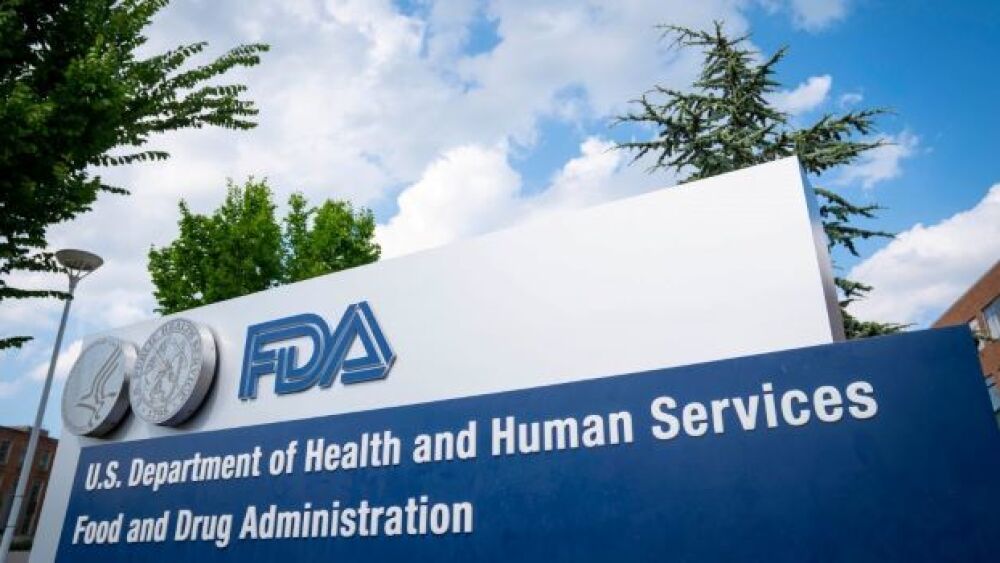The FDA approved Eisai and Biogen’s lecanemab (Leqembi) Friday afternoon. It is the second anti-amyloid antibody to be approved for Alzheimer’s disease in two years.
Sarah Silbiger/Getty Images
The FDA approved its second Alzheimer’s drug in two years – and the second for neurodegenerative drug development partners Biogen and Eisai - on Friday afternoon.
Lecanemab, to be known henceforth as Leqembi, was greenlit under the FDA’s Accelerated Approval pathway after Phase II data showed the antibody reduced the accumulation of Aβ plaque in the brain - a key biomarker for Alzheimer’s disease.
Eisai and Biogen followed that up with results from the Phase III Clarity-AD study, which showed treatment with Leqembi slowed progression of the disease.
In the trial of 856 patients with mild cognitive impairment or mild dementia, Leqembi reduced clinical decline by 27% compared to placebo after 18 months based on the Clinical Dementia Rating-Sum of Boxes (CDR-SB) assessment.
The conditional approval is being touted as a modest win by physicians.
“We’ve been trying for years, decades, and we need the win,” said Marwan Sabbagh of the Barrow Neurological Institute. “Now, we have a small win, a modest win, but it’s a win still.”
Sabbagh was an investigator on Clarity-AD and presented the full data at the 2022 Clinical Trials on Alzheimer’s Disease (CTAD) conference in November.
Howard Fillit, M.D., co-founder and chief science officer of the Alzheimer’s Drug Discovery Foundation echoed this sentiment in a statement provided to BioSpace Friday.
“This is encouraging news, but the approval of lecanemab is just the first step,” Fillit said. “Alzheimer’s therapies will only be beneficial to patients if the right drug is given to the right patient at the right time based on their unique disease pathology, and for that we need new and novel diagnostic biomarkers.”
ADDF went on to call Leqembi “the first of many drugs needed to give patients meaningful relief from Alzheimer’s disease.”
Leqembi has faced challenges to its safety profile, as three patient deaths have been potentially linked to the drug.
On Wednesday, a team from Northwestern Medicine led by Nicholas J. Reish, M.D. published a letter to the editor in the New England Journal of Medicine outlining the case of a 65-year-old Clarity AD trial participant who died after suffering a stroke.
The patient was treated with intravenous tissue plasminogen activator (t-PA), an emergency stroke-busting medication, and subsequently experienced “numerous acute intracerebral hemorrhages,” according to the authors.
Reish et. al wrote that these cerebral hemorrhages would be unusual as a complication of t-PA alone and suggested the result could be related to treatment with Leqembi.
Leqembi comes with a warning for amyloid-related imaging abnormalities (ARIA), which are known to occur with anti-amyloid antibodies.
Will Medicare Pay?
While Eisai and Biogen savor their latest regulatory win, there is also an open question as to whether Medicare will cover Leqembi. In April, the federal insurer determined it would only cover drugs in the anti-amyloid antibody class for patients who are enrolled in clinical trials.
The decision was in response to the controversy surrounding Biogen and Eisai’s Aduhelm, as physicians and other insurers questioned its efficacy.
The rationale “was intended to protect patients while gathering data to indicate whether Aduhelm… could actually help them by slowing the pace of their cognitive decline,” said Chiquita Brooks-LaSure, administrator of the Centers for Medicare and Medicaid Services, at the time of the decision.
Eisai moved quickly to shore up Leqembi’s chances of coverage when it submitted for traditional approval of the drug soon after accelerated approval was granted.
The supplemental biologics application is based on the Phase III Clarity-AD study.
In a statement Friday, CMS issued a statement on behalf of Brooks-LaSure saying it is “examining available information and may reconsider its current coverage based on this review.”
Brooks-LaSure went on to say that “If lecanemab subsequently receives traditional FDA approval, CMS would provide broader coverage using the framework we announced last year, under coverage with evidence development, on the same day.”
Eisai has estimated that Leqembi delays the progression of disease by about five months over a year-and-a-half. In a simulation study using Clarity AD data, the company predicted the drug would delay disease progression by nearly 3 years on average compared to standard of care.
While Eisai estimated the actual value of Leqembi to be $37,600 USD based partly on societal value and quality of life benefit to patients, the company announced the actual price as $26,500 USD in order to “promote broader patient access, reduce overall financial burden and support health system sustainability.”
Leqembi will be available to the U.S. market during or before the week of January 23rd, Eisai added in a separate statement.






